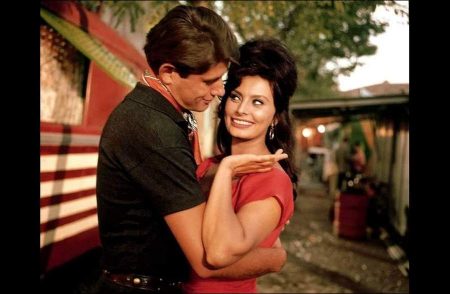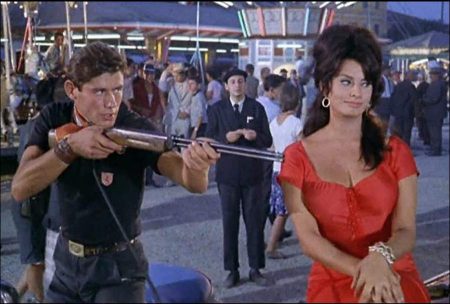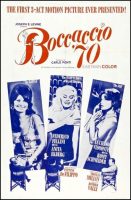Taglines: Three stories of the sexes… somewhat daring, somewhat different.
Boccaccio ’70 movie storyline. Four directors tell tales of Eros fit for a 1970 Decameron. Working-class lovers Renzo and Luciana marry but must hide it from her employer; plus, they need a room of their own. A billboard of Anita Ekberg provocatively selling milk gives a prudish crusader for public decency more than he can handle.
The wife of a count whose escapades with call girls make the front page of the papers decides to work to prove her independence, but what is she qualified to do? A buxom carnival-booth manager who owes back taxes offers herself for one night in a lottery: a nerdy sacristan and a jealous cowboy make for a lovers’ triangle. In each, women take charge, but not always happily.
Film Review for Boccaccio ’70
Boccaccio ’70 the Italian movie that opened yesterday in the complex of handsome new theatres known as Cinema I and Cinema II, located one atop the other at Third Avenue and Sixtieth Street, is nicely appropriate as a starter, for it conforms to the chic modernity and the atmosphere of well-upholstered comfort in these bright upstairs-downstairs theatres
It has glamour, sophistication, color, wit and sensuality (not necessarily in that order), all of which blend very well in the enveloping air of a facility that is to be devoted to the showing of sophisticated films. And it might almost be a production designed especially for the occasion, because it is made up of three playlets, or vignettes, from three top Italian directors whose future films will probably be offering diversion from time to time in these theatres.
Best of the samplings is the first one, a broadly satiric fantasy, turned out by Federico Fellini of recent “La Dolce Vita” fame. As a matter of fact, it could be almost a preface or apologia for the other two, for it is a withering demolition of the kind of prudery that takes exception to material that lays stress on the magnificence and voluptuousness of the female figure. And the other two vignettes certainly do.
So does this first one, naturally, since it has Anita Ekberg involved as the glaring exhibit of femininity against which the prudish antagonist raves.The idea is that this fellow, a fanatical bluenose, played by Peppino De Filippo with elaborate indignation and oozing of oily spleen, is horrified to discover a mammoth billboard showing Miss Ekberg, well exposed, set up where everyone can see it—nuns, Boy Scouts, seminarians, everybody—on a vacant lot in Rome.
At first he tries to force its removal, but doesn’t get anywhere with that because the billboard is raised to the wholesome purpose of getting people to drink more milk. Then he undertakes to deface it by bombarding it with bottles of ink. That only gets him in trouble. Soon he is waking up in the night and discovering that the image of Miss Ekberg is changing expression and attitude.It is leering at him. It is making faces. It is climbing out of the frame and walking around the lot, a monstrous figure that towers triumphantly over him.
When the puny man shouts his puny protests, Miss Ekberg burbles, “Your eyes distort everything”—which puts the point of Signor Fellini’s little satire in four simple words.Well, it is quite an extensive and amusing little jab at all those who lose their sense of proportion and reason in figuring what is decent and what is not. And Signor Fellini has made it with his familiar grasp of irony and scorn in his pictorial compositions and in his posing of grotesque characters.
It is a fine little one-hour composite of realism, farce and trick photography, with another dandy musical score by Nino Rota, who laces some familiar phrases from his “Dolce Vita” score through it.Following this bit, which, by the way, is labeled “The Temptation of Dr. Antonio,” there comes a long and tedious playlet by Luchino Visconti that might do if it were half its present one-hour length. It has to do with a lovely young contessa who discovers that her young husband, the count, has been amusing himself with a succession of extremely expensive prostitutes.
The deal that she makes to stay with him and the humiliating consequence of it are the neither surprising nor disturbing climax of their rambling dialogue.However, it must be said that Romy Schneider plays the young woman handsomely and manages to make quite fascinating the great amount of getting out of and into stylish clothing that she has to do. Thomas Milian is appropriately flabby and decadent as the count, and Signer Visconti’s camera is practically seductive with its sly and intimate points of view on expensive things.
The third playlet, called “The Raffle,” is a strictly low-comedy farce in which the usually sensitive Vittorio De Sica is obvious and unbecomingly gross with a presentation of Sophia Loren as a shooting-gallery attendant who supplements her income by occasionally raffling off her charms. The display of Miss Loren’s figure is excessive to the point of tedium, and the portrayals of her various grunting suitors are more callow than comical.How Carlo Ponti, her husband and the producer of this film, could have allowed her and Signer De Sica to revert to such an artless crudity after their powerful creation of “Two Women” is an incidental mystery.As a consequence, “Boccaccio ’70” ends like a bum dirty joke and leaves one reflecting ruefully on Signer Fellini’s witty spoof.The English subtitles through the picture are exhausting. They try to make too much of the excessive, sometimes scratchy and badly synchronized Italian dialogue.
Boccaccio ”70 (1962)
Directed by: Vittorio De Sica, Federico Fellini, Mario Monicelli, Luchino Visconti
Starring: Sophia Loren, Romy Schneider, Anita Ekberg, Marisa Solinas, Germano Gilioli, Peppino De Filippo, Tomas Milian, Romolo Valli, Luigi Giuliani, Alfio Vita, Antonio Acqua
Screenplay by: Giovanni Arpino, Suso Cecchi D’Amico
Production Design by: Elio Costanzi, Mario Garbuglia, Piero Gherardi, Piero Zuffi
Cinematography by: Otello Martelli, Armando Nannuzzi, Giuseppe Rotunno
Film Editing by: Leo Catozzo, Adriana Novelli, Mario Serandrei
Costume Design by: Piero Zuffi, Piero Tosi
Art Direction by: Sante Barelli
Music by: Nino Rota, Armando Trovajoli, Piero Umiliani
MPAA Rating: None.
Distributed by: Cineriz (Italy), Embassy Pictures (United States)
Release Date: February 23, 1962 (Italy), June 26, 1962 (United States)
Visits: 74


